The legendary FPS series that many have claimed to have redefined the genre is brought to us once again onto next generation consoles. BioShock have spawned a legion of fans and inspired countless others to follow in its footsteps, but has the series still remained one of the smartest shooters on the market?
BioShock
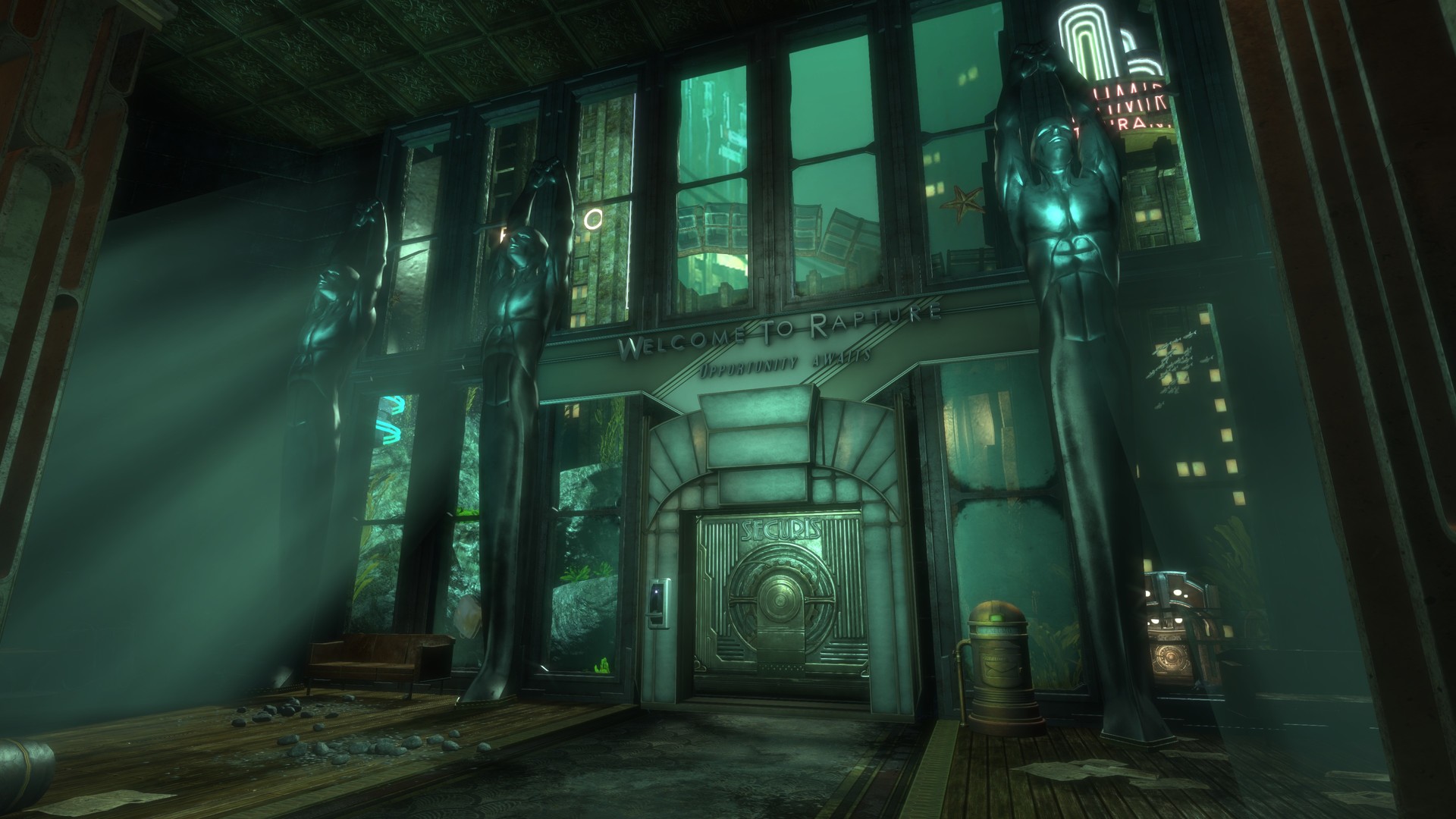
We take on the role of Jack, a simple man from a simpler time who’s found himself in the middle of the Atlantic Ocean after a plane crash. Jack finds a light house to take refuge but discovers a route to an underwater city known as Rapture. Soon he finds out that this amazing city is actually a crumbling hell hole at the bottom of the seabed, infested with crazed, spliced up lunatics and all under the watch of a sinister tyrant known as Andrew Ryan. It’s up to Jack to save the day, but as we progress through the world of Rapture we learn some dark secrets and confront some disturbing morale choices which will better Jack or make him the monster.
Rapture is an amazing and beautiful world that’s influenced after 1950’s art deco period. Everything feels retro but the world itself is crumbling around you and an agonising sense of claustrophobia builds up. Things aren’t made easy with the Splicers, yet Jack gains some awesome powers which allow him to spew fire, electricity or swarms of bees from the palm of his hands. There is a great sense of exploration, lateral elements and combat, which become more dynamic with the use of plasmids as many interactions are centered around them. You are able to hack various items such as security cameras and turrets which help for defending yourself when the numbers are stacked against you. While vending machines allow you to purchase ammo and other goods they can also be hacked to reward you with better discounts. So there are plenty of elements here to make this an engaging world to be in.
The main problem, however, is that BioShock is fairly shallow and repetitive.
In all honesty, there really are only a handful of plasmids and tonics that feel truly useful in the way of advanced tactics and that have an impact on your enemies. You may find yourself sticking to using the same few plasmids such as fire and electricity as they have other benefits in the world. Whereas plasmids, which alter the security or behaviours of your enemies, feel a little redundant as you can hack any turret to help you out. Granted the pipe puzzle can discourage hacking everything, but as the game world freezes while you’re adjusting the pipes, there’s a lack of pressure or high risk for failure. While the first two acts of the game are strongly designed, you may noticed a pattern being overused for a majority of the levels. Enter level, see exit, exit is closed off and you must do chores to open exit. It’s fine for the first few levels as there’s personality to them, but after the Andrew Ryan encounter this is where is gets dull and the formula just becomes tired.
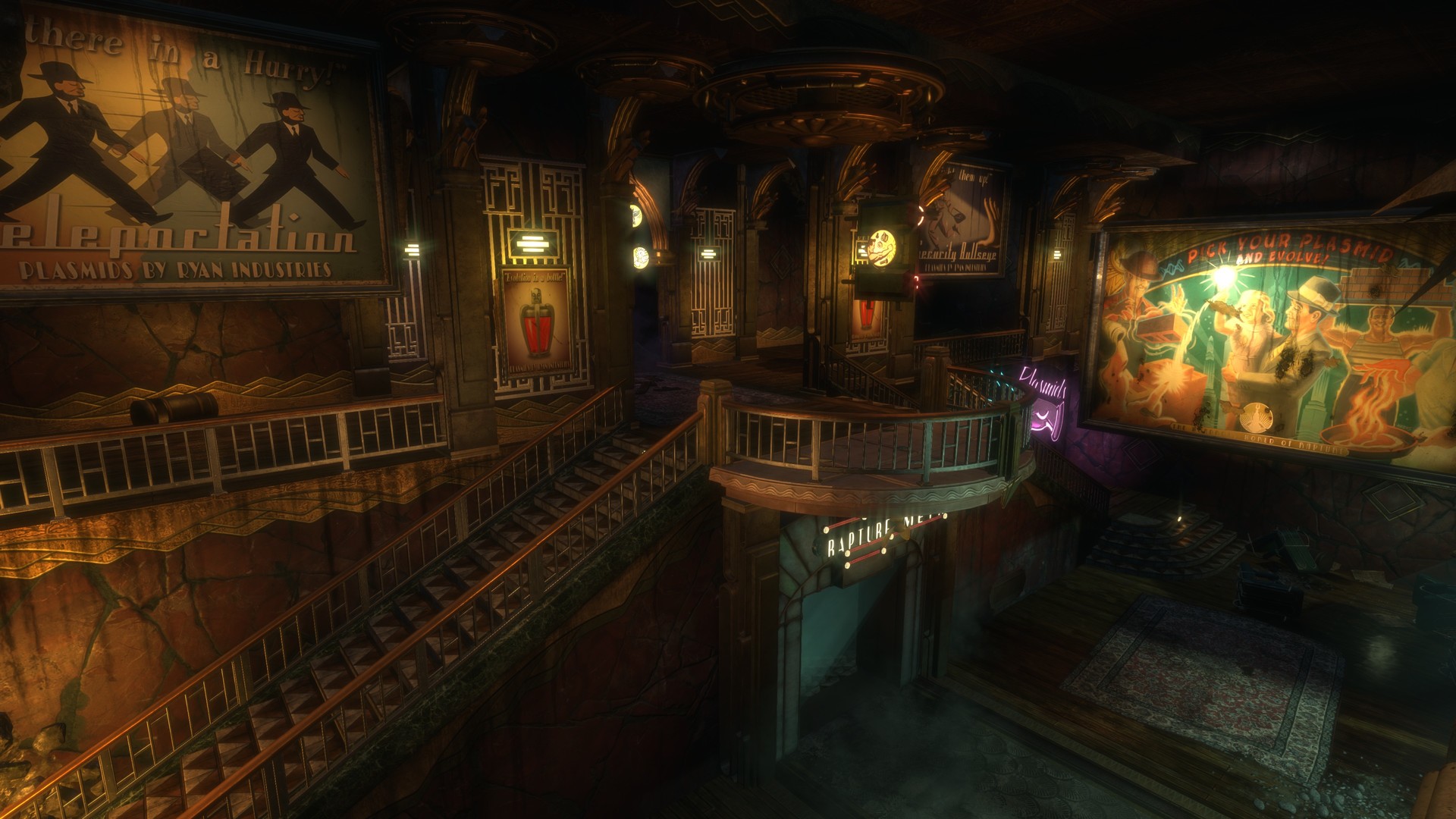
BioShock does harbor great horror elements and interesting story dynamics that really engross you through for the majority of the game. The themes and designs for certain levels are fantastic, such as the Artist’s Gallery or the Hospital with the mad Chief Surgeon. The main problem with the narrative is the big twist. Now, half of the twist is clever but when the true villain is revealed the game suddenly becomes underwhelming in plot. The introduction of Fontanne as the main antagonist is dire as he’s nothing more than a stupid sounding goon with no personality or point.
This leads to the third act feeling as though it’s running out of steam as it does nothing new or exciting in terms of gameplay and just throws a lame set piece and boss fight to finish things up on. But the additional content, such as the Museum and Ken Levine’s commentary are fascinating to hear and see, even if you have to unlock the commentary. Basically, this is just System Shock 2 but underwater. You even start off with a wrench. It’s good and a great FPS for consoles, yet it doesn’t amount to the complexity of Deus Ex.
BioShock 2
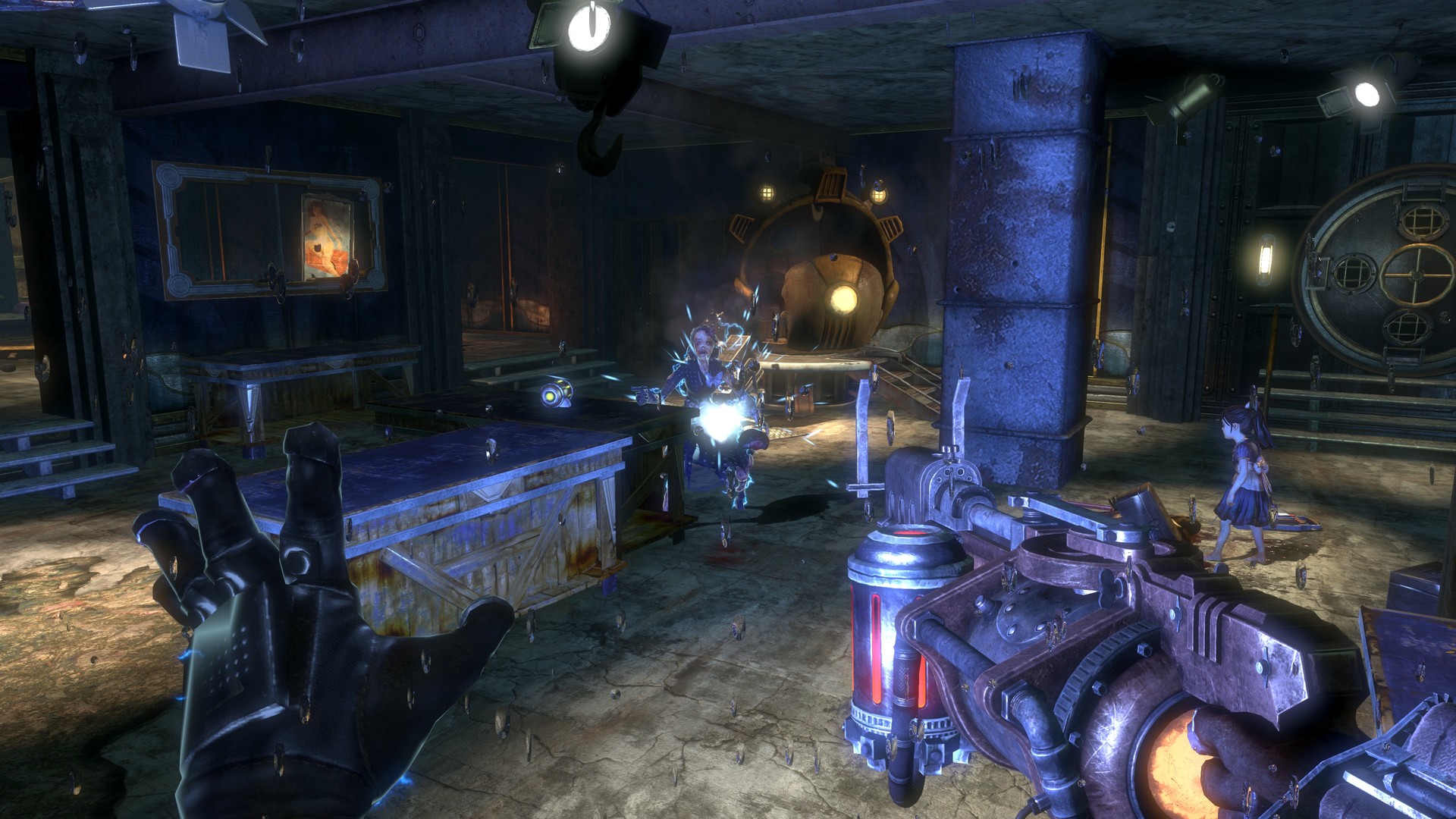
Returning to Rapture with more depth and complexity this time round, players take on the role of a loveable Big Daddy trying to find his Little Sister. Rapture has grown more dissonant and decay has rotted the roots of the once great city. Splicers have become devoted to a new leader and their artistic flare of inscribings, sinister imagery and messages of fear litter the walls. This time round we see more of the city as one of an advanced world that had an economy that crashed. We are given a greater picture of Rapture with a wider range of people’s opinions and thoughts and how they were affected. We truly understand the grasp of Andrew Ryan. Who was also not just a goon with a smock accent. The story has more of an emotional attachment to the player as you’re more than just some random guy who doesn’t speak. Delta is a trapped being with a heart and mind who only wants to free the Little Sister he protects, and to brutally kill his new enemy Sophia Lamb. Well, she did make him blow his brains out in front of her.
Playing as the Big Daddy (or Delta) invites dynamic elements that branch out risks and rewards. You can now take Little Sisters to harvest Adam from dead bodies if you desire bigger rewards. These moments turn into epic defend missions, which allow players to engage with multiple enemies in a manner of their choosing. With some new weapons such as the Rivet Gun and sawn off shotgun, you can make chowder of those splicers. But let’s not forget those plasmids which make more of an impact now, thanks to a change in the design. You can now use both weapons and plasmids at the same time, thus allowing a greater effect of tactics and a more energetic sense of combat. So this means you’re not switching back and forth between plasmid and gun and instead can combine your powers with weapons more effectively.
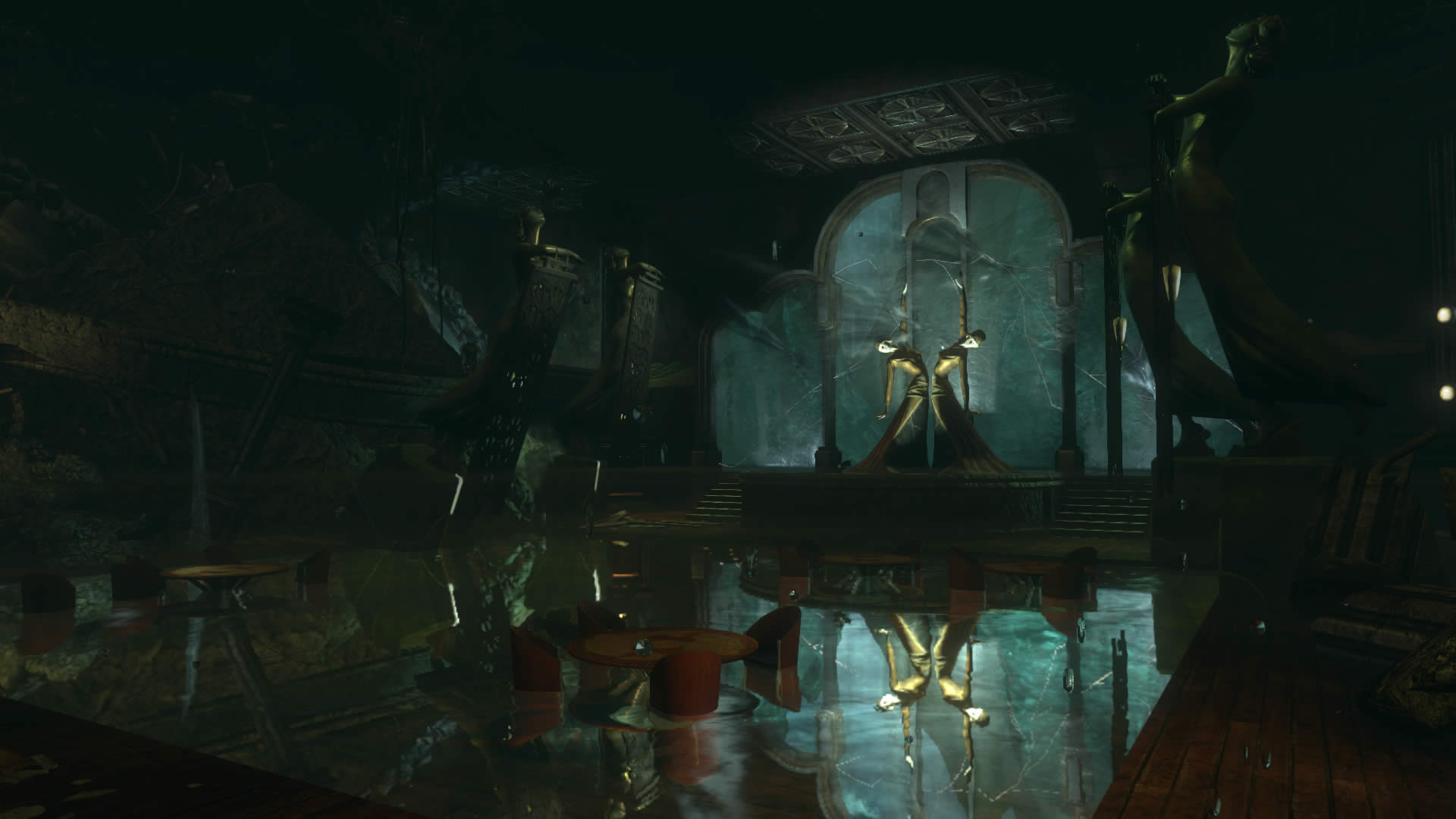
This is more a combat focused game rather than an RPG as other elements, such as hacking, are simplified for the better. True, you can still hack everything but now it’s all live during gameplay and the risks of failure are more present. You also get a grander sense of development in the world as new enemies linger in the darkness, like brutish Splicers and the eerie Big Sisters who put up one hell of a fight.
The main complaints of BioShock 2 it that is needlessly borrows elements from the original. The photography camera makes a reprise, allowing you to analyse Splicers. This really isn’t needed and just makes the game feel like a big (but impressive) expansion pack at times. Thankfully, the third act is much stronger and overall does a good job at pacing the game and doesn’t draw out events or levels for too long, a problem the original suffered from. While, on a plus note, the endings are more satisfying in a sense and, depending on your choices, you actually feel the impact of them.
Actually, this does right a lot of wrongs from the previous game and, to me, this is the best BioShock game. It’s also one I misunderstood the first time I played it. Truly the highlight of the collection and it also includes some of the best additional content of this package with Minerva’s Den.
Oh yeah, then there’s Infinite.
BioShock: Infinite
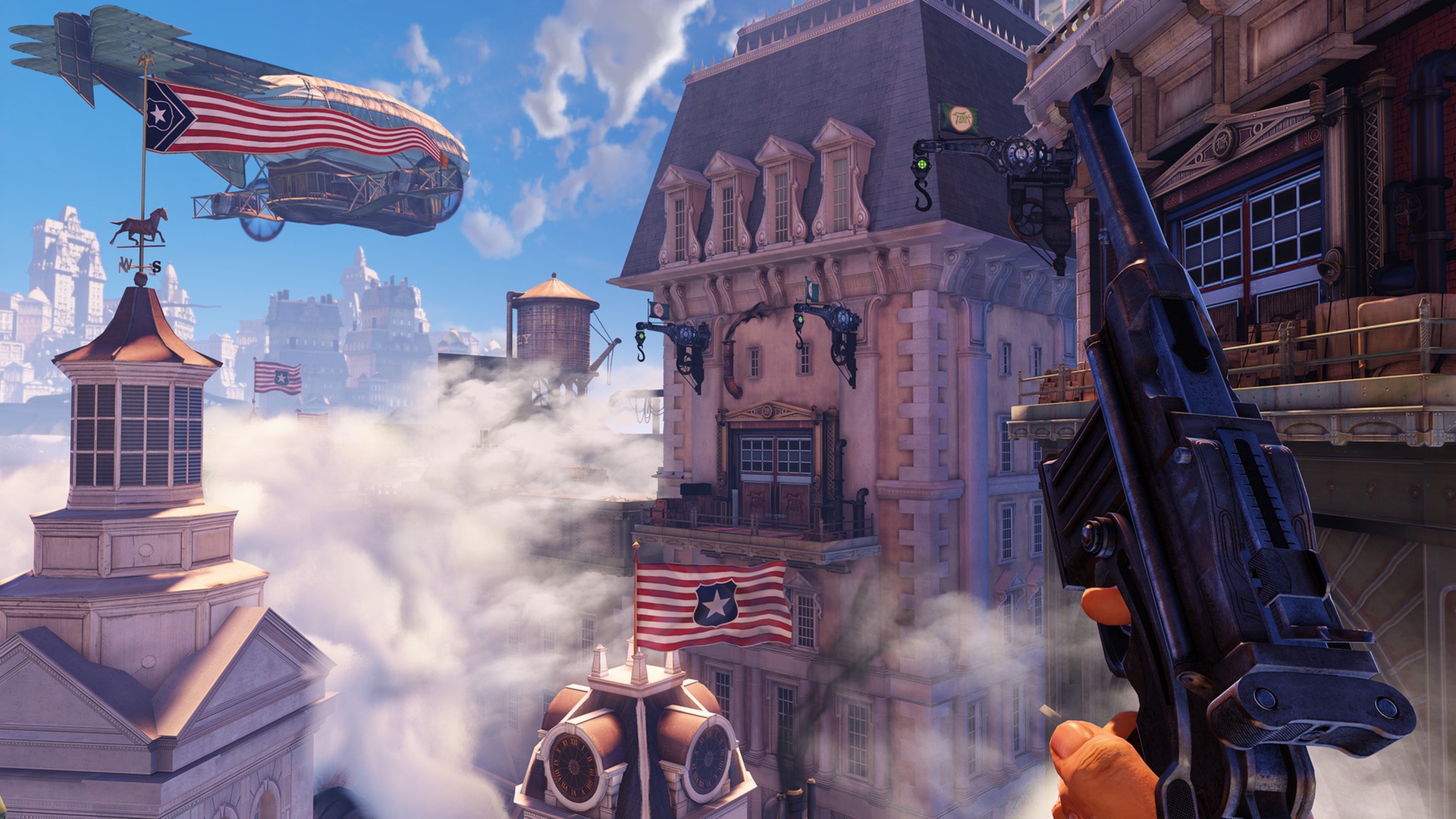
What BioShock: Infinite does extremely well is to introduce a world that’s stunningly beautiful and hugely immersive. The floating city of Columbia is just wonderful to explore while being rich with history and harboring an interesting backstory to keep you invested. It’d be the perfect holiday destination … until you realised it’s massively racist. But the depth of the story is fantastic, with a range of great characters such as Booker Dewitt, Elizabeth and Comstock who are all backed by brilliant voice talent such as Troy Baker. Let’s not forget how Infinite has one of gaming’s best twists to end things on a depressing yet high note.
Before I go on, I must say I don’t think Infinite is a bad game. The gameplay is solid and certain elements such as the Sky Hook and the battles you can have on it are pretty energetic and entertaining. However, the majority of the shooting is extremely generic and even with some dynamic sounding elements, they’re just a little one dimensional without some major complexity to them. Certain aspects such as exploration have key moments with side quests and often the rewards are satisfying and the world itself is interesting to engage with. Yet this is the only thing to break up the prolonged shooting. Very little to none of the lateral elements are introduced as well, making the experience feel a little repetitive. There are some moments which just dragged on, such as the Ghost boss fight which repeated several times over with little changes to keep it interesting, and the end segment on Comstock’s ship which just became dull.
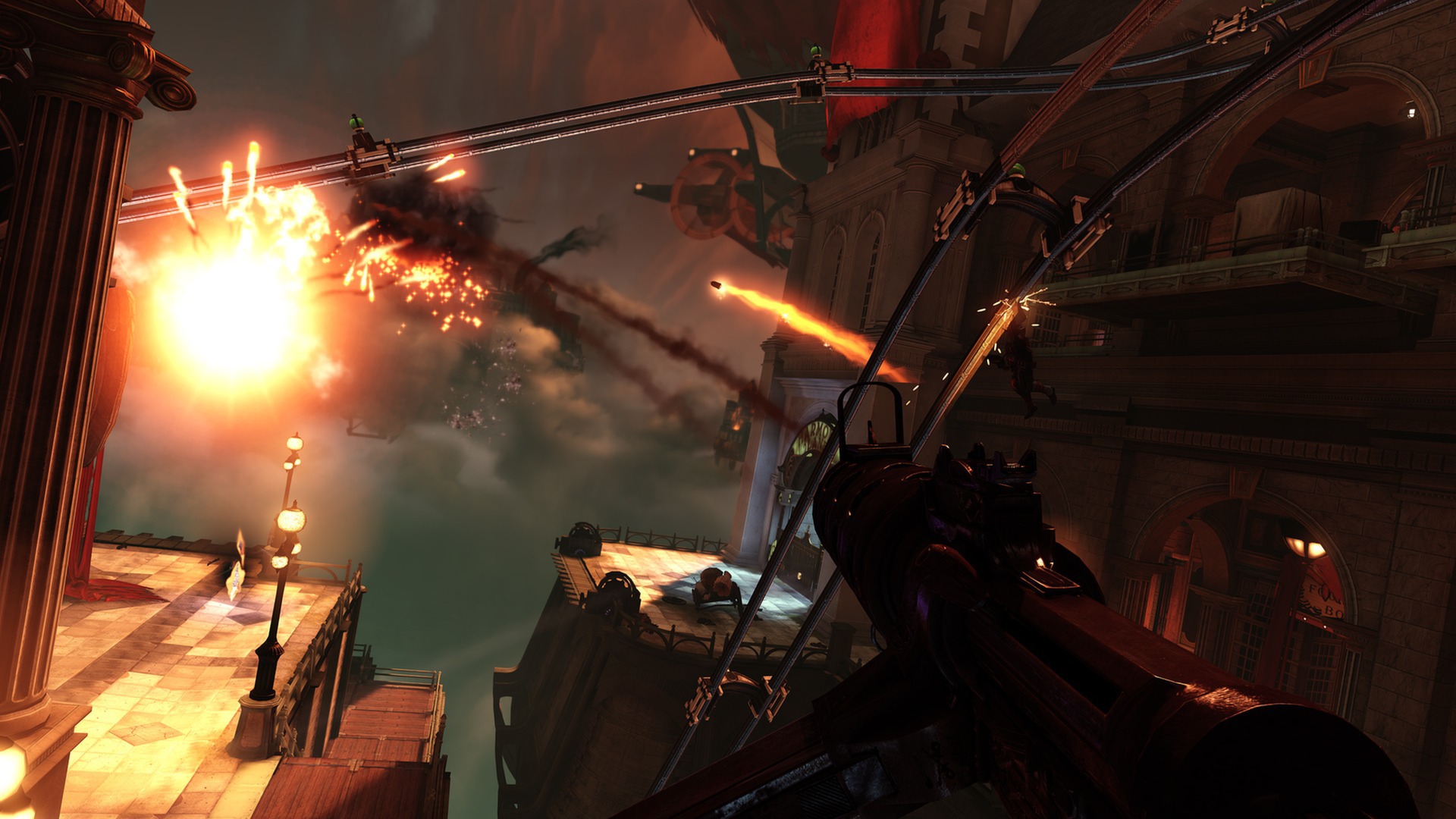
This overall affects the game’s pacing as it’s just rinse and repeated shooting with very little to break it up other than some story elements. I did like a couple moments, like the stand off soon after you arrive at the beach, and the first hour of the game which is brilliantly presented and paced. But after you fight the Secret Society of the Crows, you see the game is just repeating itself and even robotic George Washington gets dire to fight after a few times. The set piece at the end just felt like a relentless horde of brain dead enemies and defense objectives which just went on and on, and the use of Songbird was not justified or entertaining. There’s the tactical aspect of combat where you can shoot and use powers but the range of weapons are pretty uninspiring and the powers are again just mostly rehashed from the original game. At least Elizabeth is a decent AI character who helps out most times. Not a bad game, but underwhelming in many respects and one that I personally didn’t feel deserved the hype, yet the Burial at Sea expansion feels much tighter in design and breaks up the shooting a little more fluently.
So Ken Levine pretty much made the type of FPS game he originally wanted to kill off and made it popular. I don’t know whether to applaud in confusion or laugh with remorse. But to be fair, these are all good games in their own rights and as much as I moan about Infinite, I highly respect it and feel it must be played for some awesome moments of actions (even if the shooting aspect does go on) and the amazing story. BioShock should be played as much as System Shock or Deus Ex as it was a game changer in some respects. But the highlight is BioShock 2, a game I really disliked when I first played it, yet fell in love with it. This is a definitive collection of a very good series that shouldn’t be forgotten and amounts to more than any Call of Duty game ever.



























































